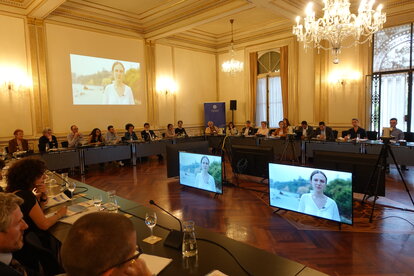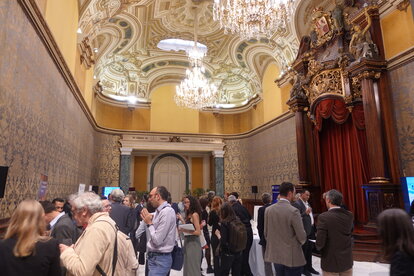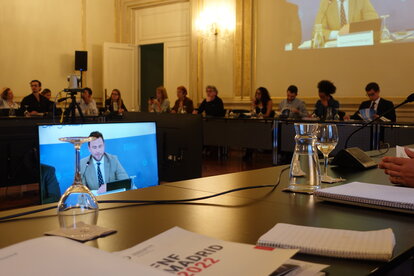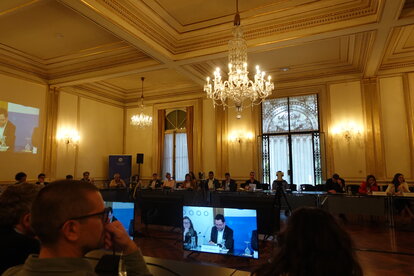Migration
Climate Change as a Cause for Migration

Roundtable of experts (from left to right): Matias Ibañez, Former Programme & Research Officer, Department of Sustainable Development and Regional Integration at IEMed; Anna Ferro, Senior Manager Migration and development at CeSPI; Roger Albinyana, Managing Director at IEMed; Grammenos Mastrojeni, Senior Deputy Secretary General Energy and Climate Action UfM; David Henneberger, Head of Office Spain, Italy, Portugal & Mediterranean Dialogue at FNF Madrid; Xavier Aragall, Programme Manager of the Euromed Survey at IEMed; Amal El Ouassif, International Relations Specialist at Policy Center for the New South.
© FNF MadridOn May 4th, at the headquarters of the Union of the Mediterranean (UfM) in Barcelona, we presented with the European Institute of the Mediterranean (IEMed)our latest joint report titled Climate Change and Migration: Understanding Factors, Developing Opportunities in the Sahel Zone, West Africa, and the Maghreb. This comprehensive report, which is now available for download on our website, represents months of work, including data collection in Senegal and Morocco, interviews with local communities, and statistical analysis. Our investigative team, consisting of Xavier Aragall and Matías Ibañez from the IEMed, Amal El Ouassif from the Policy Center for the New South (PCNS), and Anna Ferro from the Centro Studi di Politica Internazionale (CeSPI), joined us to present the main findings.
Ambassador Grammenos Mastrojeni, the Senior Deputy Secretary General of Energy and Climate Action at UfM, delivered a keynote speech, providing a contextual overview of the issue at hand and describing the predicted scenarios - both across the Mediterranean and in other parts of the world - related to climate change and human displacement.

Participants watching our Migration Policy Group video on the study trip in Senegal. Pictured in the screen: Valeria Sinisi García, Project Manager for the Mediterranean Dialogue at FNF Madrid.
© FNF MadridThe evening commenced with David Henneberger, Director of our FNF Madrid Office, who explained the project’s objectives and our office’s commitment to addressing environmental degradation as a driver of migration. He specifically highlighted our work in the Maghreb and West Africa regions through collaboration with our local offices. During our study trip to Senegal in November 2022, which involved our researchers and other migration and climate change experts, we observed firsthand the clear signs of a changing climate in two main fishing ports and their surrounding communities. In Southern Morocco, Amal El Ouassif delved deeper into the role of climate change as a risk multiplier, emphasizing how droughts and limited access to water have become major drivers of migration in the region. This phenomenon is also observed in other North African countries like Egypt and Algeria, as confirmed by data collected by reputable organizations.

Participants and panelists networking at the UfM’s Salón de Trono.
© FNF MadridAmbassador Mastrojeni raised an intriguing point during his talk, discussing the demographics of migrating populations. He began by referencing the poverty trap, and explaining that someHe began by referencing the poverty trap, and explaining that individuals below the international poverty line often cannot and do not even consider migration. However, he emphasized that climate change is altering this dynamic by compelling even the most economically disadvantaged to seek new environments. The Maghreb, Sahel, and West Africa regions face numerous threats, including desertification, unpredictable rainfall, ocean acidification, and changing fish migration patterns. These factors exacerbate living conditions, particularly in West Africa and the Sahel, making these regions among the most mobile and vulnerable to the diverse impacts of climate change.

Pictured in the screen: David Henneberger, Head of Office Spain, Italy, Portugal & Mediterranean Dialogue at FNF Madrid.
© FNF MadridReports from institutions like the UNHCR warn that approximately 1.2 billion people are at risk of climate-related displacement. Although estimates of the exact numbers vary, it is evident that migration from the areas studied in this report to Europe is likely to increase at unprecedented levels. This trend will become more pronounced as environmental changes continue to affect fundamental resources such as water and food production. While projections can never be entirely accurate, the report acknowledges ongoing debates among experts. Nonetheless, it contributes to existing research and literature on the nexus between climate change and migration while aiming to raise greater awareness of this critical issue. Individuals forced to leave their homes and communities in search of stability and better opportunities are often stigmatized in political rhetoric and the media. Therefore, understanding the causes behind these movements is essential to address the issue effectively. It is now more apparent than ever that mitigation and adaptation efforts must be strengthened worldwide, particularly across the Mediterranean region, to build resilient societies in the face of an uncertain climate.

Debate with our participants at UfM’s Salón de Baile. Picutred in the screen: Roger Albinyana, Managing Director at IEMed.
© FNF Madrid